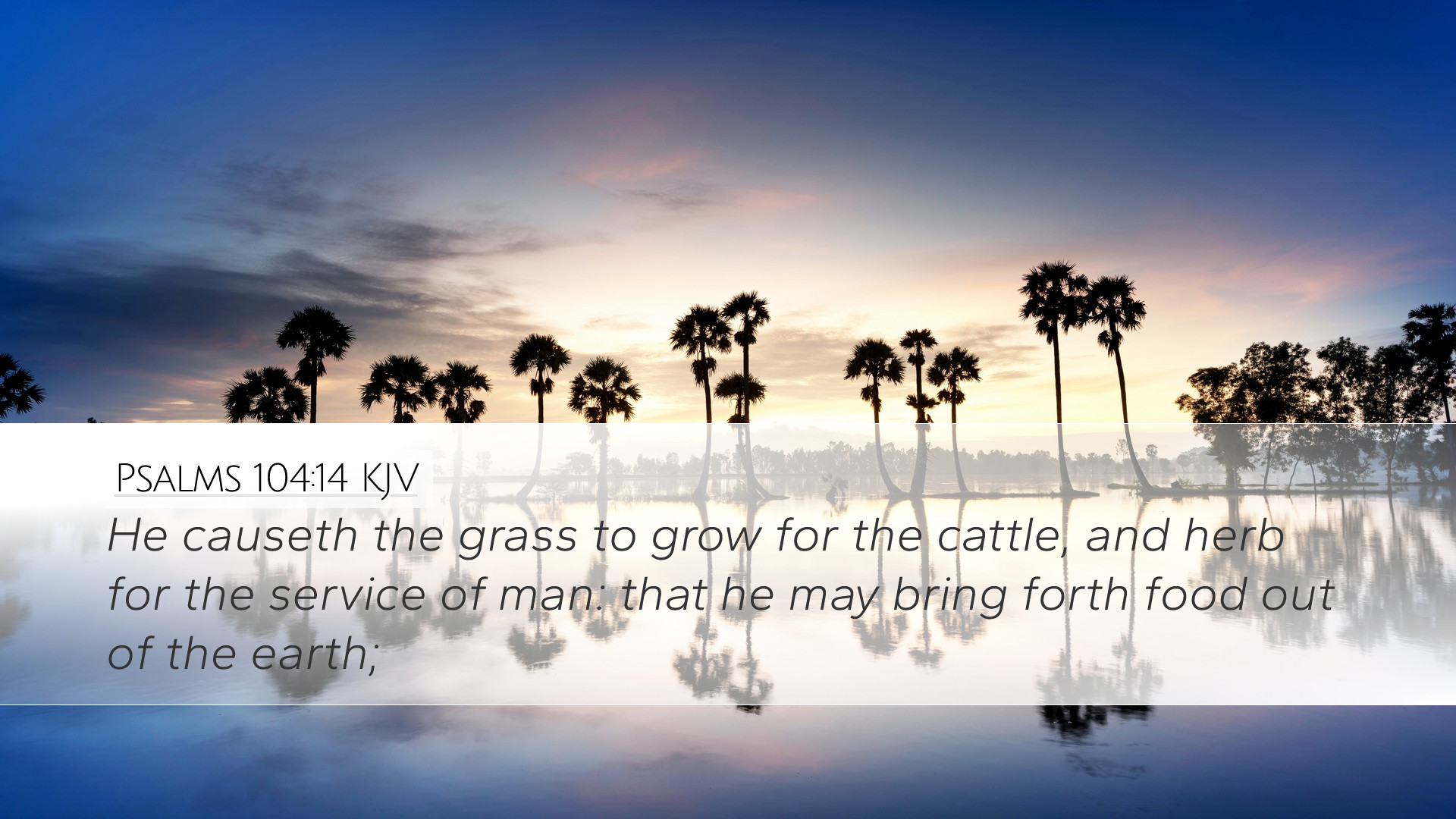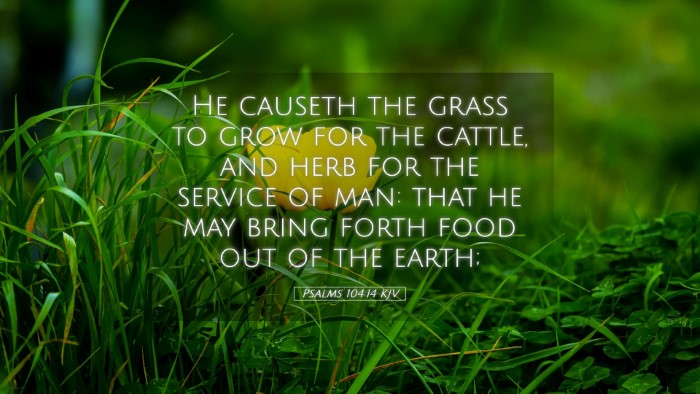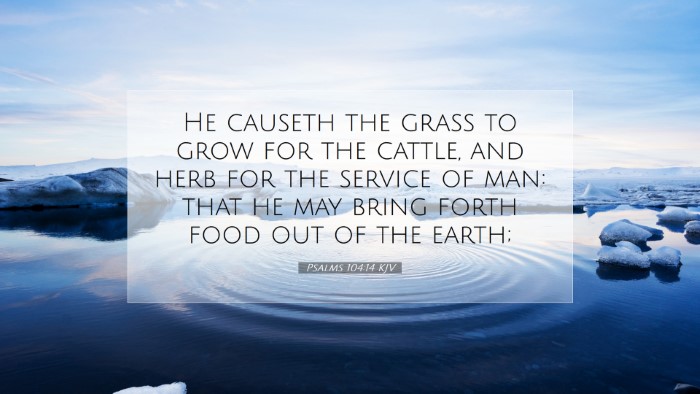Psalms 104:14 Commentary
"He causeth the grass to grow for the cattle, and herb for the service of man: that he may bring forth food out of the earth;" (Psalm 104:14 KJV)
Introduction
This passage from Psalms encapsulates the creativity and provision of God in the natural world. It vividly illustrates God’s role as Creator, highlighting the interconnectedness of all creation and His care for both animals and humanity. In this commentary, we will explore insights derived from prominent public domain commentaries, reflecting on themes of divine provision, stewardship, and the goodness of God.
The Divine Provision for Cattle
Matthew Henry emphasizes the sovereignty and providence of God in nature. The phrase "He causeth the grass to grow for the cattle" indicates that God not only created the earth but continues to sustain it. Henry points out that the grass mentioned is crucial for the sustenance of cattle, revealing God's meticulous care even for creatures that seem less significant.
Albert Barnes further elaborates on this, noting that the grass is a product of God’s creative and sustaining power. He states, "The grass grows not by chance but by the divine appointment." This suggests a deeper theological insight into the nature of provision—a direct act of God ensuring that His creation thrives.
Moreover, Adam Clarke reflects on the relationship between the cattle and the earth's produce. He posits that cattle serve a dual purpose—they are beneficiaries of God’s provision and, in turn, provide service to mankind (e.g., labor and dairy). This highlights a cycle of dependence among God's creations.
Herbs for Humanity’s Use
The second part of the verse, "and herb for the service of man," shifts the focus from animals to humans. Matthew Henry discusses how herbs represent the bounty of the earth that God provides for human sustenance. He notes that this provision is not just for survival but also serves a purpose in human flourishing: cooking, healing, and enjoyment.
Barnes adds that the herbs are provided "for the service of man," highlighting their role in not only meeting basic needs but also in cultivating a robust society. The mention of service suggests a vocational aspect of humanity’s relationship with creation—humans are called to steward and utilize the resources rightly, maintaining balance and respect for God's creation.
Clarke argues that the provision of herbs illustrates God’s abundant goodness. He asserts that God has outfitted the world with resources that are both essential and delightful, purposing them for man’s use and enjoyment. Such considerations lead to reflections on gratitude and stewardship in contemporary Christian thought, emphasizing our role in caring for the environment.
Theological Implications
As we contemplate the divine provision described in this verse, several theological implications arise. Henry points to the unchanging nature of God as a provider, aligning with the theological premise that God’s goodness is a constant across all of creation. This can instill a sense of trust in believers; irrespective of life’s situations, God continues to provide for His creations.
Barnes’ commentary encourages readers to recognize the relationship between God’s provision and human responsibility. The understanding that resources are given for a purpose calls believers to engage in ethical stewardship, emphasizing that while we receive abundantly, we are also tasked with the responsibility to utilize these gifts wisely and sustainably.
Clarke adds a practical dimension, suggesting that individuals must recognize their dependence on God's resources and act in ways that honor these gifts. This includes tending to creation, ensuring its sustainability and reflecting God’s character in how we manage the resources entrusted to us.
Application for Pastors and Theologians
For pastors and theologians, Psalm 104:14 serves as a rich passage for exploring themes of divine providence, creation care, and the ethical implications of resource use. It provides a springboard for sermons and discussions about God’s ongoing work in creation, as highlighted by Matthew Henry’s detailed insights into God’s care.
Moreover, the call to stewardship resonates in contemporary circles, where environmental concerns increasingly come to the forefront. Barnes’ focus on the service to man invites believers to engage in social justice discussions—how we use natural resources can impact the wellbeing of communities.
Clarke’s understanding of enjoyment and dependence can lead to discussions on gratitude toward God’s creation, fostering a culture of appreciation among congregations. In teaching, pastors can leverage this verse to encourage their communities to engage actively in both contemplation and action concerning the environment.
Conclusion
Psalms 104:14 wonderfully encapsulates God’s dynamic interaction with His creation. God’s provision for both cattle and humans speaks to the intricate balance that exists within His created order. By integrating insights from Henry, Barnes, and Clarke, we recognize the importance of divine sustenance, ethical responsibility, and the overarching goodness of God.
This verse invites pastors, students, theologians, and scholars to reflect on their roles as stewards of God's creation—encouraging a deeper understanding of our relationship with nature and with the Creator. As we cultivate an awareness of God’s provisions in the world, may we be inspired to act with gratitude, wonder, and responsibility.


